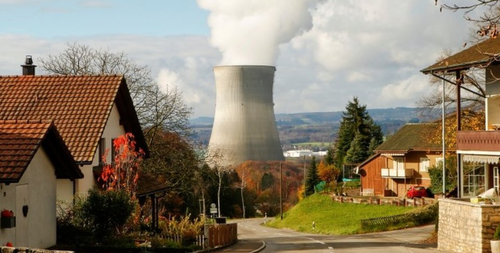
Switzerland is the latest country to get on board the "nuclear power before country-wide blackouts" trend, following in the recent footsteps of countries like Germany. In fact, a group of Swiss politicians has launched a petition with the intent of revising the country's energy policy to keep nuclear as part of the mix, as a way to guarantee having enough power going forward.
The country had planned to close its 5 nuclear reactors after a decision was made post-Fukushima in 2017. it has already shut down one reactor.
Now, politicians are trying to gather the 100,000 signatures necessary for a referendum to change the country's constitution and prevent nuclear from being shut out. Outcomes can take years to be put into effect after signatures are gathered, Reuters wrote this week.
The politician group, called "Stop Blackouts" said this week: "Until recently, Switzerland had safe and virtually CO₂-free electricity production: the environmentally and climate-friendly combination of hydro and nuclear power is to be abandoned for no reason at all."
President of the committee Vanessa Meury said: "We cannot do without nuclear power plants."
Like Germany, Switzerland is also dealing with potential energy shortages as a result of the Russian war in Ukraine. It has already mulled the idea of four hour regional blackouts in the case of shortages.
As we noted days ago in a piece by Felicity Bradstock at OilPrice.com, an unjustified fear of nuclear energy is preventing the industry from moving forward.
It pointed out that despite a lack of public understanding of nuclear technology, meaning that it can sometimes be confused with nuclear weapons, there was a general optimism around nuclear energy when it first emerged several decades ago. It seems that the current negative public perception of nuclear power stems mainly from the nuclear disasters that were seen around the world in real-time.
Although relatively few died during these incidents compared to deaths worldwide from other energy operations, the incidents were widely televised and the fear of the unknown spread rapidly.
The piece also postulated that perhaps the only way to improve public perception of nuclear energy is through re-education that highlights the relative safety of the technology compared to other energy operations.
In addition, as the public and international organizations put pressure on state governments to go green, better marketing of nuclear energy could help shift the public perception, as people begin to see the carbon-free energy source as necessary for a green future. However, for now, governments are feeling the mounting pressure to ‘get it right’, with the potential for any mishap to add to the long-term demonization of nuclear power.
Switzerland is the latest country to get on board the “nuclear power before country-wide blackouts” trend, following in the recent footsteps of countries like Germany. In fact, a group of Swiss politicians has launched a petition with the intent of revising the country’s energy policy to keep nuclear as part of the mix, as a way to guarantee having enough power going forward.
The country had planned to close its 5 nuclear reactors after a decision was made post-Fukushima in 2017. it has already shut down one reactor.
Now, politicians are trying to gather the 100,000 signatures necessary for a referendum to change the country’s constitution and prevent nuclear from being shut out. Outcomes can take years to be put into effect after signatures are gathered, Reuters wrote this week.
The politician group, called “Stop Blackouts” said this week: “Until recently, Switzerland had safe and virtually CO₂-free electricity production: the environmentally and climate-friendly combination of hydro and nuclear power is to be abandoned for no reason at all.”
President of the committee Vanessa Meury said: “We cannot do without nuclear power plants.”
Like Germany, Switzerland is also dealing with potential energy shortages as a result of the Russian war in Ukraine. It has already mulled the idea of four hour regional blackouts in the case of shortages.
As we noted days ago in a piece by Felicity Bradstock at OilPrice.com, an unjustified fear of nuclear energy is preventing the industry from moving forward.
It pointed out that despite a lack of public understanding of nuclear technology, meaning that it can sometimes be confused with nuclear weapons, there was a general optimism around nuclear energy when it first emerged several decades ago. It seems that the current negative public perception of nuclear power stems mainly from the nuclear disasters that were seen around the world in real-time.
Although relatively few died during these incidents compared to deaths worldwide from other energy operations, the incidents were widely televised and the fear of the unknown spread rapidly.
The piece also postulated that perhaps the only way to improve public perception of nuclear energy is through re-education that highlights the relative safety of the technology compared to other energy operations.
In addition, as the public and international organizations put pressure on state governments to go green, better marketing of nuclear energy could help shift the public perception, as people begin to see the carbon-free energy source as necessary for a green future. However, for now, governments are feeling the mounting pressure to ‘get it right’, with the potential for any mishap to add to the long-term demonization of nuclear power.







